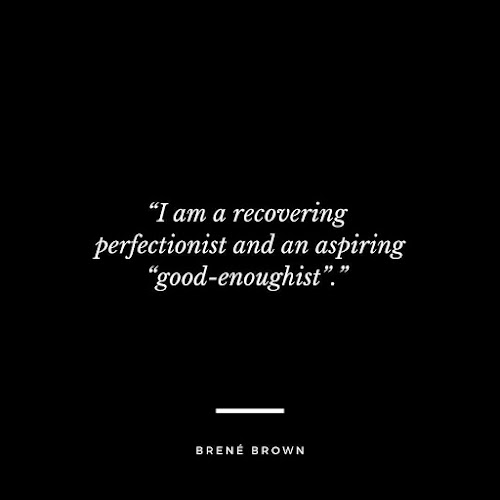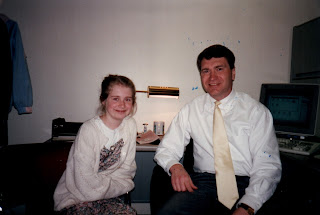Good Enough
I'll never forget the first time I failed.
I was seventeen, and it was the fall of my senior year of high school. I'd packed my schedule to the brim because, according to my guidance counselor, that's what I needed to do to get into a good college. I was taking mostly AP and honors classes, and on top of that, I was filling out college applications, working 15-20 hours a week at my after-school job at a grocery store, rehearsing several afternoons a week for my lead role in the school musical, teaching Sunday school at church, tutoring an underclassman during my free periods, working on the yearbook staff, writing for the school newspaper, and the list goes on. I didn't even like doing some of these things -- I did them because being "well-rounded" and building a resumé was pushed as an essential part of the college application process. I was a proud rule-follower; I did what I was told to do, and then some.
Looking back, I'm not even sure how it was humanly possible to do all of that and stay afloat, and I guess that's the problem -- I was barely staying afloat. That year, I was completely burnt out. I was constantly sick and exhausted, and missed so many days of school that I started falling behind in some of my classes. I had doubled up on math during 10th grade so that I'd be able to take calculus as a senior, because my guidance counselor insisted, "you won't have a chance of getting into the most competitive colleges without calculus on your transcript." So there I was, struggling my way through 12th grade calculus, on top of an impossibly full schedule, and I was failing. For the first (only) time in my life, I was failing a class.
What brought me to that point was years of unrelenting perfectionism. Perfection, especially when it came to academics and behavior, had been my driving force throughout childhood. I prided myself on being "good" -- the teacher's pet, the star student. I thrived on the accolades and attention that came with doing all that I "should" do and more, of meeting and exceeding the expectations of the adults in my life in an effort to please. I wanted to avoid disappointing others at all costs, even if it cost me something.
As it turns out, all of that emphasis on perfection did cost me something. For one, it meant that I didn't ever try things that I didn't have a natural talent for because I was afraid of failing at them (hence the reason I never participated in sports as a kid, a decision I now regret). Also, it meant that I never really knew what it felt like to grapple with something difficult, to struggle, to fail and to come back stronger from it.
So when I saw my grades in calculus plummeting to depths I'd never before experienced, I was humiliated, panicked, and at a complete loss for what to do next. Navigating my way out of the situation meant humbling myself to do things I'd never before had to do, like staying after school for extra help with the teacher, asking classmates for help outside of class, and spending lots of extra time at home working through the formulas and trying to understand. And when none of those things brought my grade up to an acceptable level, I had to do something that I saw as the ultimate failure -- I had to go to the guidance counselor and ask to drop the class. I was terrified -- afraid of how dropping a class would make me look in the eyes of my peers, my teachers, my parents, and college admissions officers.
In the end, it turned out to be the best thing I could have done. As it turned out, I'd already fulfilled my math requirements for graduation, so I didn't actually even need calculus. I was able to drop the class and pick up another section of English, a subject that I actually enjoyed and was planning to major in. No, I no longer had the perfect transcript for college, but it turned out to be good enough. I still got into the college of my choice with an academic scholarship, and I even did well enough on my math placement exam that I was able to "place out" of intro level math in college.
I learned an important lesson about perfectionism back then: sometimes, our quest for perfection can actually hamper our success. Even worse, often our quest for perfection can get in the way of our happiness and even our physical and mental health. Ignoring our own instincts and needs in an attempt to appear perfect and please others can be a recipe for disaster.
Brené Brown is a researcher, writer, and lecturer (and all-around inspiring human) who is well known for her work around the concepts of shame and vulnerability. Within those areas of research, the topic of perfectionism comes up quite frequently. In her book Daring Greatly, she writes:
Perfectionism is not self-improvement. Perfectionism is, at its core, about trying to earn approval. Most perfectionists grew up being praised for achievement and performance (grades, manners, rule following, people pleasing, appearance, sports). Somewhere along the way, they adopted this dangerous and debilitating belief system: 'I am what I accomplish and how well I accomplish it. Please. Perform. Perfect.' Healthy striving is self-focused. How can I improve? Perfectionism is other-focused: What will they think? Perfectionism is a hustle. (Daring Greatly, pg. 129)
Reading this, as well as many other pieces of research she has shared about perfectionism, has done a lot to help better shape my perspective on the topic. She likens perfectionism to "a twenty-ton shield that we lug around thinking it will protect us, when in fact it's the thing that's really preventing us from being seen" (129). She asserts that striving for perfection promotes a fear of failure that keeps us from tackling the things we really want in life; if we think that we will be anything less than perfect, we become so paralyzed we don't even try.
Along my novel-writing journey, I have once again found myself coming face to face with my old nemesis, perfectionism. To some degree, I believe that perfectionism is rearing its ugly head because of the nature of fiction writing -- as with many other creative endeavors, writing is subjective, and as such, it is not quantifiable. With other jobs, it's easy to see when it has been done and done well simply by looking at metrics. If you are running a business, for instance, examining your quarterly balance sheets or reading customer satisfaction surveys can tell you whether you've been successful in your work. Creative processes don't work like this. That's where perfectionism weasels its way in, makes you question the quality of your work, makes you doubt that it's really good enough. After all, no matter how good it is, it could always be better.
More than ever, right now I am seeing what Brené says about perfectionism playing out in my own work. In Daring Greatly, she says, "The fear of failing, making mistakes, not meeting people's expectations, and being criticized keeps us outside of the arena where healthy competition and striving occurs" (129). And that leads to the big question, the one that I've been reflecting on a lot lately -- when do we decide that our writing is complete, that it's "good enough"? Where do we draw the line between healthy striving and striving for a level of perfection that is impossible to reach? At what point does the work of editing and polishing our work go from a necessary part of the process to a defense mechanism we use to protect ourselves from rejection? As long as it is a "work in progress," it is safe from the harshest criticism. But once we decide that it is "finished," it is tempting to feel that there is a presumption of perfection that goes along with that -- that a finished work is somehow synonymous with a perfect work.
And so, as my mind begins to pull me once again toward impossible standards of perfection, I'm reminded of the day in 12th grade that I decided to let go of those impossible standards and instead embrace the "good enough." As it turns out, good enough is more than enough.




I love that..."good enough is more than enough." What a mantra!
ReplyDelete